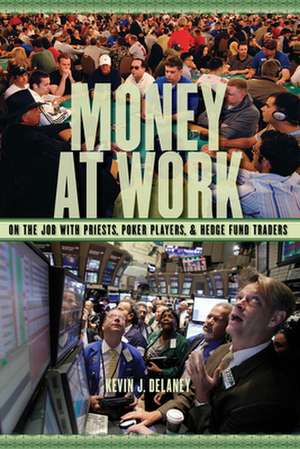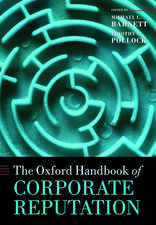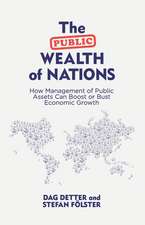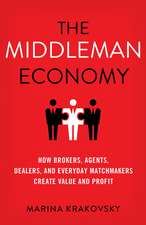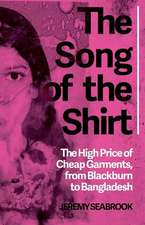Money at Work – On the Job with Priests, Poker Players and Hedge Fund Traders
Autor Kevin J. Delaneyen Limba Engleză Hardback – 15 iul 2012
Preț: 329.75 lei
Nou
Puncte Express: 495
Preț estimativ în valută:
63.11€ • 65.64$ • 52.10£
63.11€ • 65.64$ • 52.10£
Carte tipărită la comandă
Livrare economică 14-28 aprilie
Preluare comenzi: 021 569.72.76
Specificații
ISBN-13: 9780814720806
ISBN-10: 0814720803
Pagini: 280
Dimensiuni: 152 x 229 x 15 mm
Greutate: 0.54 kg
Editura: MI – New York University
ISBN-10: 0814720803
Pagini: 280
Dimensiuni: 152 x 229 x 15 mm
Greutate: 0.54 kg
Editura: MI – New York University
Recenzii
"Most of us, a few saints and one-per-centers aside, work for money, but not with it in the same direct manner of most of the subjects of Delaneys intriguing study. We dont manipulate cash to keep score like poker players (literally) or financial traders (figuratively) or work within a rich, mixed-message tradition of seeing money as a gift from God and ripe for human abusethe root of all evillike most clergy. Yet money work does have its effects, as Delaney, a sociologist at Temple University in Philadelphia, demonstrates: every workplace spawns its own money culture, its own cautionary tales of greed and fatal errors, its own conception of the universal economic lubricant." Macleans.ca, August 2012
"The book is a fascinating exploration of how, like mud on your shoe, you track money wherever you go. He finds, for instance, that bond traders don't just talk about bonds all day and then go home; with family they think of relationships in terms of profit and loss." MarketPlace.org
"Most of us see our social class and childhood as influences on how we view finances. What is less acknowledged, and less studied, says the scholar, is how the daily routines and economic structures of different jobs produce distinct ways of thinking and talking about money. Delaney's goal for what he terms a "cognitive economic sociology of money and work" is to uncover the elements of cognition and emotion at play in a given job, as well as the "cognitive dilemmas" that arise from specific work circumstances." Nina C. Ayoub, The Chronicle of Higher Education, September 10th 2012
"Most of us, a few saints and one-per-centers aside, work for money, but not with it in the same direct manner of most of the subjects of Delaney's intriguing study. We don't manipulate cash to keep score like poker players (literally) or financial traders (figuratively) or work within a rich, mixed-message tradition of seeing money as a gift from God and ripe for human abuse - the root of all evil - like most clergy. Yet money work does have its effects, as Delaney, a sociologist at Temple University in Philadelphia, demonstrates: every workplace spawns its own money culture, its own cautionary tales of greed and fatal errors, its own conception of the universal economic lubricant." Macleans.ca, August 2012 "The book is a fascinating exploration of how, like mud on your shoe, you track money wherever you go. He finds, for instance, that bond traders don't just talk about bonds all day and then go home; with family they think of relationships in terms of profit and loss." MarketPlace.org "Most of us see our social class and childhood as influences on how we view finances. What is less acknowledged, and less studied, says the scholar, is how the daily routines and economic structures of different jobs produce distinct ways of thinking and talking about money. Delaney's goal for what he terms a "cognitive economic sociology of money and work" is to uncover the elements of cognition and emotion at play in a given job, as well as the "cognitive dilemmas" that arise from specific work circumstances." Nina C. Ayoub, The Chronicle of Higher Education, September 10th 2012
"Readers will love this book for two reasons. First, it is written in a way that makes the reading highly enjoyable. Second, it brings a totally new approach to our understanding of money. The idea that the work we do affects the way we view money is simple and brilliant. Economic sociologists and other social scientists interested in money have much to learn from Money at Work." -Richard Swedberg, author of "Principles of Economic Sociology"
"Most of us, a few saints and one-per-centers aside, work for money, but not with it in the same direct manner of most of the subjects of Delaney's intriguing study. We don't manipulate cash to keep score like poker players (literally) or financial traders (figuratively) or work within a rich, mixed-message tradition of seeing money as a gift from God and ripe for human abuse - the root of all evil - like most clergy. Yet money work does have its effects, as Delaney, a sociologist at Temple University in Philadelphia, demonstrates: every workplace spawns its own money culture, its own cautionary tales of greed and fatal errors, its own conception of the universal economic lubricant." Macleans.ca, August 2012 "The book is a fascinating exploration of how, like mud on your shoe, you track money wherever you go. He finds, for instance, that bond traders don't just talk about bonds all day and then go home; with family they think of relationships in terms of profit and loss." MarketPlace.org
"The book is a fascinating exploration of how, like mud on your shoe, you track money wherever you go. He finds, for instance, that bond traders don't just talk about bonds all day and then go home; with family they think of relationships in terms of profit and loss." MarketPlace.org
"Most of us see our social class and childhood as influences on how we view finances. What is less acknowledged, and less studied, says the scholar, is how the daily routines and economic structures of different jobs produce distinct ways of thinking and talking about money. Delaney's goal for what he terms a "cognitive economic sociology of money and work" is to uncover the elements of cognition and emotion at play in a given job, as well as the "cognitive dilemmas" that arise from specific work circumstances." Nina C. Ayoub, The Chronicle of Higher Education, September 10th 2012
"Most of us, a few saints and one-per-centers aside, work for money, but not with it in the same direct manner of most of the subjects of Delaney's intriguing study. We don't manipulate cash to keep score like poker players (literally) or financial traders (figuratively) or work within a rich, mixed-message tradition of seeing money as a gift from God and ripe for human abuse - the root of all evil - like most clergy. Yet money work does have its effects, as Delaney, a sociologist at Temple University in Philadelphia, demonstrates: every workplace spawns its own money culture, its own cautionary tales of greed and fatal errors, its own conception of the universal economic lubricant." Macleans.ca, August 2012 "The book is a fascinating exploration of how, like mud on your shoe, you track money wherever you go. He finds, for instance, that bond traders don't just talk about bonds all day and then go home; with family they think of relationships in terms of profit and loss." MarketPlace.org "Most of us see our social class and childhood as influences on how we view finances. What is less acknowledged, and less studied, says the scholar, is how the daily routines and economic structures of different jobs produce distinct ways of thinking and talking about money. Delaney's goal for what he terms a "cognitive economic sociology of money and work" is to uncover the elements of cognition and emotion at play in a given job, as well as the "cognitive dilemmas" that arise from specific work circumstances." Nina C. Ayoub, The Chronicle of Higher Education, September 10th 2012
"Readers will love this book for two reasons. First, it is written in a way that makes the reading highly enjoyable. Second, it brings a totally new approach to our understanding of money. The idea that the work we do affects the way we view money is simple and brilliant. Economic sociologists and other social scientists interested in money have much to learn from Money at Work." -Richard Swedberg, author of "Principles of Economic Sociology"
"Most of us, a few saints and one-per-centers aside, work for money, but not with it in the same direct manner of most of the subjects of Delaney's intriguing study. We don't manipulate cash to keep score like poker players (literally) or financial traders (figuratively) or work within a rich, mixed-message tradition of seeing money as a gift from God and ripe for human abuse - the root of all evil - like most clergy. Yet money work does have its effects, as Delaney, a sociologist at Temple University in Philadelphia, demonstrates: every workplace spawns its own money culture, its own cautionary tales of greed and fatal errors, its own conception of the universal economic lubricant." Macleans.ca, August 2012 "The book is a fascinating exploration of how, like mud on your shoe, you track money wherever you go. He finds, for instance, that bond traders don't just talk about bonds all day and then go home; with family they think of relationships in terms of profit and loss." MarketPlace.org
Notă biografică
Descriere
A fascinating new way to consider our relationships with money
